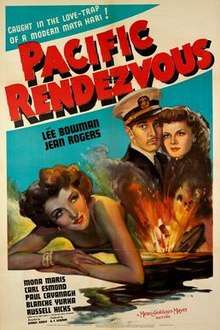Pacific Rendezvous
Pacific Rendezvous is a 1942 film directed by George Sidney. It stars Lee Bowman and Jean Rogers.[2]
| Pacific Rendezvous | |
|---|---|
 | |
| Directed by | George Sidney |
| Written by | Harry Kurnitz P.J. Wolfson George Oppenheimer |
| Starring | Lee Bowman |
| Music by | David Snell |
| Cinematography | Paul Vogel |
| Edited by | Ben Lewis |
Production company | |
Release date | May 21, 1942 |
Running time | 76 minutes |
| Country | United States |
| Language | English |
| Budget | $225,000[1] |
| Box office | $407,000[1] |
The previous film version was the 1935 film Rendezvous, starring William Powell and Rosalind Russell, directed by William K. Howard and Sam Wood. P. J. Wolfson and George Oppenheimer were credited with the screenplay of Rendezvous, and Bella Spewack and Samuel Spewack were credited as adapters of the book The American Black Chamber by Major Herbert O. Yardley (1931). [3]
Plot summary
A code expert (Lee Bowman) working for Naval Intelligence is assigned to decode enemy messages despite his desire for active duty.
Cast
- Lee Bowman as Lt. William 'Bill' Gordon
- Jean Rogers as Elaine Carter
- Mona Maris as Olivia Kerlov
- Carl Esmond as Andre Leemuth
- Paul Cavanagh as Cmdr. Charles Brennan
- Blanche Yurka as Mrs. Savarina
- Russell Hicks as John Carter
- Arthur Shields as Prof. Harvey Lessmore
- William Post Jr. as Lanny
- William Tannen as Jasper Dean
- Frederick Worlock as Dr. Jackwin
- Curt Bois as Kestrin
- Felix Basch as de Segroff
- Addison Richards as Gordon Trisby
- Edward Fielding as Secretary of the Navy
- Hans Conried as Hotel Desk Clerk (uncredited)
- Byron Foulger as Decoding Room Clerk (uncredited)
- Michael Visaroff as Col. Petroff (uncredited)
Production
The film was directed by George Sidney who says that George Seitz meant to direct the film but dropped out at the last minute. Sidney directed a screen test for Lee Bowman. He used Jean Rogers to appear alongside him and MGM executives liked the test so much that both were cast in the film. The film was shot in 22 days although Sidney was unhappy he had so little preparation time.[4]
Reception
According to MGM records the film earned $253,000 in the US and Canada and $154,000 elsewhere, making the studio a profit of $23,000.[1]
References
- The Eddie Mannix Ledger, Los Angeles: Margaret Herrick Library, Center for Motion Picture Study.
- "Archived copy". Archived from the original on 2012-07-17. Retrieved 2011-05-07.CS1 maint: archived copy as title (link)
- https://catalog.afi.com/Catalog/moviedetails/27393?sid=e9cd4328-7c42-4da5-9b8a-a2d4065cea39&sr=5.7235603&cp=1&pos=0
- Davis, Ronald L. (2005). Just Making Movies. University Press of Mississippi. p. 64.